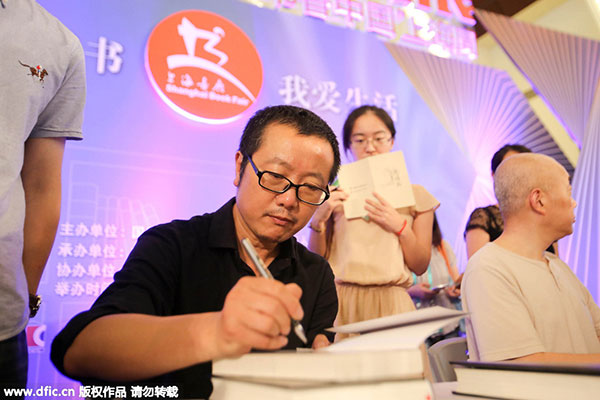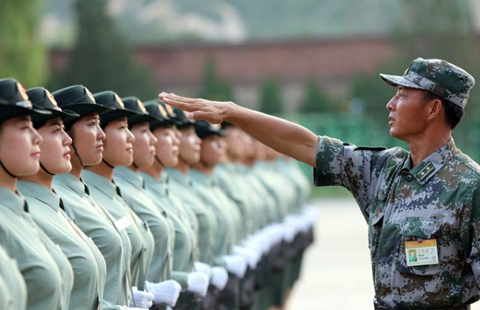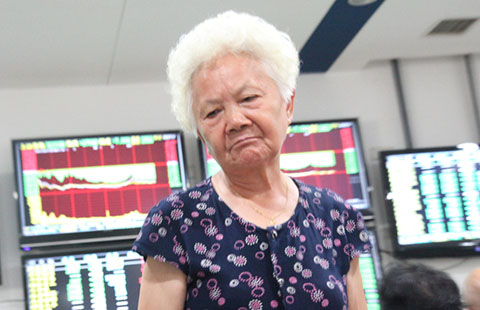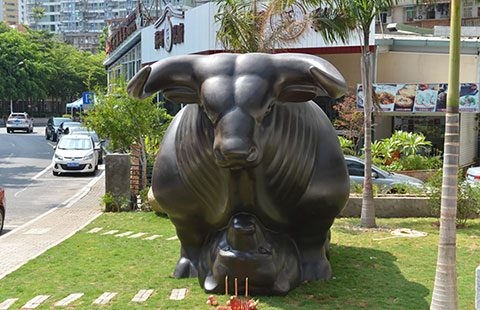Hugo Award winner Liu Cixin on writing science fiction
Updated: 2015-08-26 15:05
(chinadaily.com.cn)
|
||||||||
 |
|
Chinese author Liu Cixin has won the Hugo Award for Best Novel on Aug 23. [Photo/IC] |
Liu became the first Asian author to win the Hugo Award for Best Novel, when his novel, The Three-Body Problem, or Santi, was announced as the winner for this year's award for best science fiction or fantasy achievement.
The creation process for Santi was no different from his other works, and was written after the story was well developed in his mind, Liu said in an interview with people.com.cn.
"I like to think hard about the content of the novel, both its outline and the details," the author said.
While working out the plot of a novel, Liu said that he prefers walking and usually walks past several hours.
As Liu recalled, the conception of the novel was slow, but the actual writing was done quickly. It took him almost four years to complete the Santi trilogy, and most of the time was spent thinking up the concept and story. When he actually began writing, each book was finished in two or three months.
"As a science fiction author, I usually get lost in my wild and fanciful thoughts. Many ideas are not generated in a sudden flash. However, they are like plants, growing slowly. When the time comes, they naturally come into view," he said.
Liu gives an example of a weapon that can destroy a whole world is created through reducing spatial dimensions: the idea was in his mind long before, but was only used when writing The Three-Body Problem.
Meanwhile, reading widely is the cornerstone of creation, Liu emphasized. The first science fiction he read was French novelist Jules Verne's Journey to the Center of the Earth, a book his father had. Liu said he took great pleasure in reading this book and felt like the novel was especially written for him.
Thereafter, Liu read a lot of science fiction. He recalled they brought meaning to his humdrum life.
As for future creations, Liu has his own worries that new technology may be making his science fiction ideas obsolete. When the advancement of science goes beyond science fiction, the sense of mystery from science then disappears.
"For science fiction authors, it's more than a sense of crisis; it is the end of the world. When the future breathes down your neck, you cannot get rid of it. Then, what can you write?" Liu asked.
- Turkey to hold snap parliamentary election
- Caroline Kennedy used personal email for official business
- Czech appeals for closing Schengen external border
- DPRK says inter-Korean contact gives lesson to South Korea
- Trial starts for Chinese scholar expelled from Norway
- Britain to crack down illegal working

 Chinese long jumpers leap to history
Chinese long jumpers leap to history
 Female honor guards train for military parade debut
Female honor guards train for military parade debut
 Top 10 richest universities in China
Top 10 richest universities in China
 The looks of despair in Chinese stock market
The looks of despair in Chinese stock market
 Goodbyes and tears as left-behind children head home
Goodbyes and tears as left-behind children head home
 Bull crushes bear in stock market statue
Bull crushes bear in stock market statue
 Top 10 emerging cities on the Chinese mainland
Top 10 emerging cities on the Chinese mainland
 Jamaican Fraser-Pryce again becomes world champion
Jamaican Fraser-Pryce again becomes world champion
Most Viewed
Editor's Picks

|

|

|

|

|

|
Today's Top News
Central bank announces rate cut to bolster real economy
Investors in for long haul amid selloff
30 heads of state to attend China's Victory Day celebrations
ROK, DPRK agree to defuse tension
Tsinghua University crowned 'wealthiest' Chinese school
China share plunge smacks world markets
China equities collapse sparks global markets sell-off
Targets set for regional integration
US Weekly

|

|







